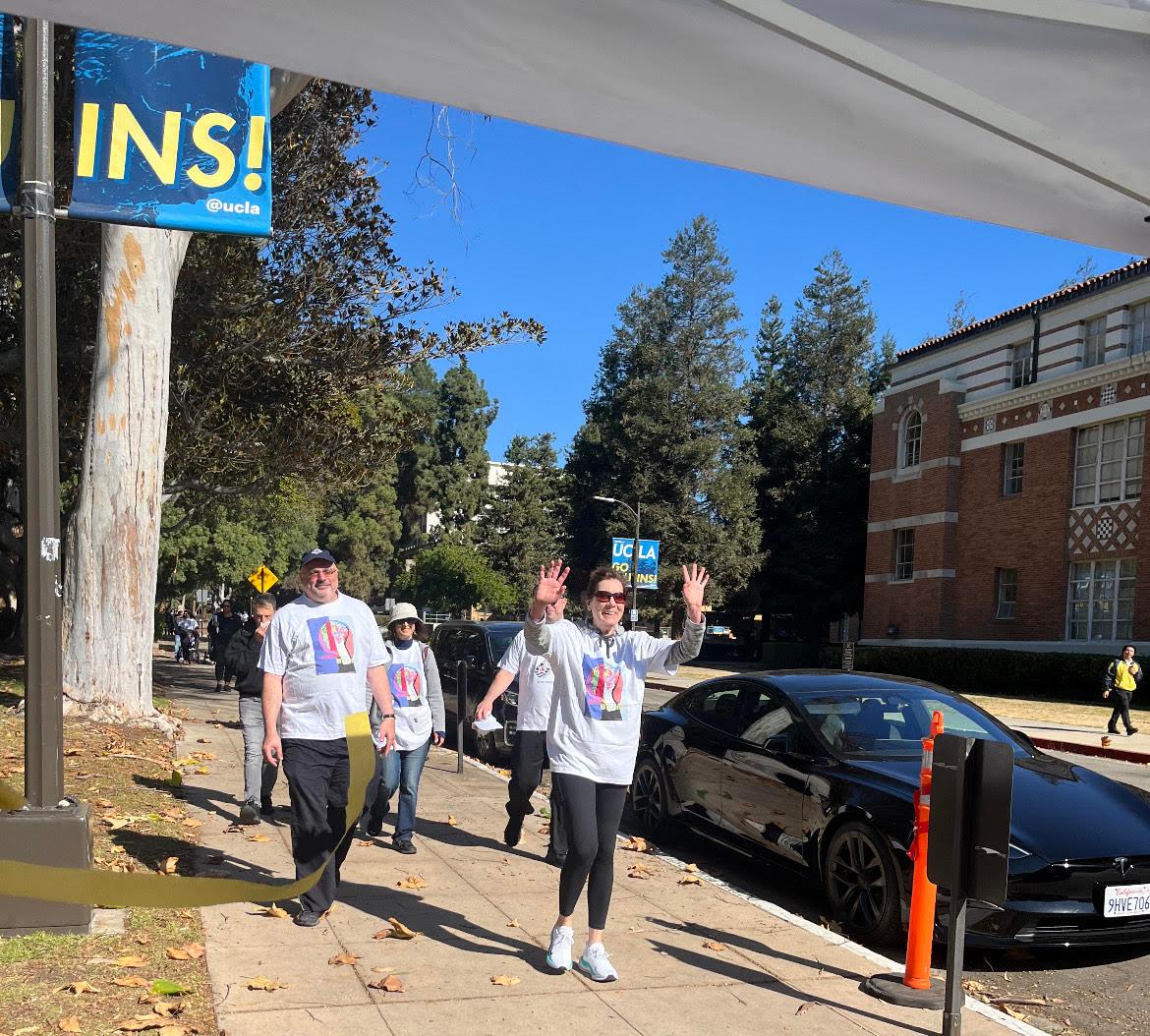Heart of the Brain raises $1.5 million for brain cancer awareness in annual walk
Many physicians, organizers and donors attended the Heart of the Brain donor walk. The event was geared around raising awareness and funds surrounding brain cancer and brain cancer research. (Courtesy of Prannay Veerabahu)
By Prannay Veerabahu
Dec. 4, 2024 8:45 p.m.
UCLA physicians, donors and patients gathered in Dickinson Court on Nov. 3 for an annual brain cancer awareness and fundraising walk.
Heart of the Brain – a brain cancer advocacy and fundraising organization – hosted the walk, raising $1.5 million this year for research and clinical trials, according to their website. The walk consisted of breakfast and live speeches from physicians and family members of brain cancer survivors before culminating in a walk around a portion of the UCLA Campus.
Michael Neidorf said he founded Heart of the Brain alongside his wife Becky after their daughter was diagnosis with an inoperable brain tumor in 2003. The goal of the organization is to raise money for research and new solutions to brain cancer, Michael said.
“The goal has always been for us to raise money for research to hopefully find non surgical ways to deal with brain tumors,” he said. “Isabel’s tumor is quite large ... and there are parts of it that are just simply not accessible for surgery.”
Heart of the Brain is one of many organizations that UCLA Health researchers rely on for its funding, said Christopher Carbado, executive director of development for UCLA neurology and neurosurgery departments. The organization gives members of the UCLA and Greater Los Angeles community access to the inner workings of the new and innovative biomedical research projects, he added.
Heart of the Brain initially hosted larger scale fundraising events at night with food and entertainment. However, they faced challenges in continuing these events due to their vendor’s inaccessibility, and transitioned three years ago to a walk, Neidorf said.
“It (The Solefully Committed Walk) is an incredible show of support,” Michael said. “You are not in this fight alone, and you have a lot of people that love you.”
The event was a relaxed environment for people to meet and share their stories, said Becky Neidorf, co-founder of Heart of the Brain. Becky added that she hopes attendees leave supportive of their cause and continue to spread the word about brain cancer awareness.
“It (the walk) means a lot to us because of our daughter, and just the amount of people who have been affected by this disease,” Becky said. “They all come together in support of bringing awareness and also in support of finding a cure for all forms of brain cancer.”
The Nov. 3 crowd included family, friends and professional associates of the Neidorfs along with other brain cancer survivors and their families.
“Some of the patients are not even affiliated with UCLA,” Becky said. “They come, my daughter is engaged with them, talks to them, and she can relate to what they are going through and it’s just a fun morning.”
Among the attendees were David Geffen School of Medicine chair of neurosurgery Dr. Linda Liau and neuro-oncologist Dr. Tim Cloughesy, who have served as Isabel Neidorf’s doctors during her fight against brain cancer.
Liau said she is working on developing new treatment plans to target traditionally aggressive or inoperative tumors that responded poorly to traditional measures, such as an mRNA vaccine. Cloughesy said his work focuses on developing new treatments sensitive to the unique targets and vulnerabilities of tumors such as Isabel’s.
The funds raised by the Solefully Committed to Finding a Cure walk will go towards funding the UCLA Brain Tumor center, according to Heart of the Brain’s website.
The Solefully Committed Walk also served as a conduit for participants to tangibly learn about the impact of brain cancer research on UCLA patients such as Isabel Neidorf, added Christopher Carbado. At the walk, attendees could speak directly to brain cancer researchers such as Liau and Cloughesy.
“Opportunities like this introduces us to folks that may not have an affiliation with the university, but by this event, they become aware of the amazing research that’s taking place,” Carbado said. “(The Neidorfs) are sharing their story within their network, so it certainly has an amazing impact, because it’s their personal story.”
One of the significant motivations for founding Heart of the Brain was the Neidorf family’s desire to play a larger role in determining the research they powered, Michael said. After the Neidorf family was introduced to Liau, they decided to shift their focus towards targeting specific research initiatives, he added.
“We realized pretty quickly that when you’re with these big national organizations, you have a limited amount of influence on what they do,” he said.
Andy Clough, who attended the walk, said he found his donation to The Heart of the Brain to be impactful.
“I’ve seen the work that they do, I’ve seen the success that they have,” Clough said. “There certainly are other organizations that are worthy as well, but this has been a consistent program that’s going on for a very long time.”
